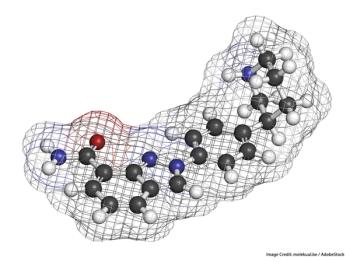
Patients with heavily pretreated vulvar squamous cell carcinoma experienced responses with pembrolizumab monotherapy in a nonrandomized phase 2 trial, regardless of PD-L1 status.

Your AI-Trained Oncology Knowledge Connection!


Patients with heavily pretreated vulvar squamous cell carcinoma experienced responses with pembrolizumab monotherapy in a nonrandomized phase 2 trial, regardless of PD-L1 status.

A presentation from the Society of Gynecologic Oncology 2021 Virtual Annual Meeting on Women’s Cancer highlighted data investigating the combination of ixabepilone and bevacizumab compared with ixabepilone monotherapy.

Data presented at the Society of Gynecologic Oncology 2021 Annual Meeting on Women’s Cancer found a statistically significant benefit with fuzuloparib maintenance therapy compared with placebo for patients with platinum-sensitive, recurrent ovarian cancer.

HIPEC of paclitaxel and cisplatin during surgical debulking of advanced epithelial ovarian cancer appears to be superior to cisplatin alone, according to findings from a single-institution study.

In addition to promising effects on tumor progression risk, apatinib added to doxorubicin for ovarian cancer in certain settings increased overall response rate versus single-agent doxorubicin.

The androgen receptor inhibitor enzalutamide, an approved therapy for certain types of prostate cancer, has shown activity for the treatment of patients with recurrent or advanced endometrioid endometrial cancer.

Hardesty detailed her expectations for the focus of the conference and the exciting topical opportunities presented this year’s SGO Annual Meeting compared with past years.

Five-year follow-up data from the SOLO-1 trial continue to show progression-free survival benefit of olaparib as maintenance therapy following platinum-based chemotherapy in the frontline setting for ovarian cancer.

Results of prospective, open-label trial of olaparib maintenance in patients with platinum-sensitive relapsed ovarian cancer continued to demonstrate efficacy of the PARP inhibitor in this setting.

CancerNetwork® discussed updates in the treatment of gynecologic cancers with Ursula A. Matulonis, MD.

The combination of cediranib and olaparib demonstrated modest efficacy in patients with recurrent, metastatic, or persistent endometrial cancer; however, this was not significantly different compared to cediranib alone.

PFS improvement as well as a trend to overall survival prolongation has been demonstrated with niraparib maintenance in patients with platinum-sensitive recurrent ovarian cancer with or without germline BRCA mutations.

Although responses were limited in patients with paclitaxel-pretreated cervical cancer, eribulin may still show promise in those who are naïve to treatment with the chemotherapy agent.

Data from the phase 2 OVARIO study showed extended progression-free survival benefit of niraparib plus bevacizumab in patients with heavily pretreated advanced ovarian cancer.

A dostarlimab triplet combination showed promise in a phase 2 study for treatment of patients with platinum-resistant ovarian cancer, according to a presentation at the Society of Gynecologic Oncology 2021 Virtual Annual Meeting on Women’s Cancer.

An update from the phase 3 ARIEL4 trial presented at the Society of Gynecologic Oncology 2021 Virtual Annual Meeting on Women’s Cancer supports the continued use of rucaparib in patients with BRCA-mutant relapsed advanced ovarian cancer, based on progression-free survival and response data.

Patients with newly diagnosed ovarian cancer who had interval debulking surgery and visible residual disease showed promising outcomes when treated with the PARP inhibitor niraparib, according to a post hoc analysis of a phase 3 clinical trial.

Following a prior announcement that the phase 3 KEYNOTE-775 trial met both primary end points of progression-free and overall survival benefit, data for the pembrolizumab/lenvatinib combination were presented at the Society of Gynecologic Oncology 2021 Annual Meeting on Women’s Cancer.

The results of a post-hoc exploratory analysis of the phase III ARIEL3 trial were promising.

The TWiST analysis of the phase III ENGOT-OV16/NOVA trial evaluated the time without symptoms or toxicity for niraparib vs placebo in patients with recurrent ovarian cancer.

The phase II trial evaluated dendritic cell–based immunotherapy with concomitant administration of chemotherapy vs chemotherapy alone.

Results of a phase II trial evaluating pembrolizumab in combination with bevacizumab and oral metronomic cyclophosphamide were presented at SGO 2019.

Avelumab alone or with pegylated liposomal doxorubicin did not improve survival in this phase III trial, but a subgroup analysis showed promising findings.

Early results of the WISP trial, which is evaluating risk-reducing salpingo-oophorectomy vs salpingectomy with delayed oophorectomy, were presented in Honolulu.

At SGO 2018, an early study showed ‘encouraging’ PFS with trastuzumab added to combination carboplatin/paclitaxel for advanced HER2/neu-overexpressing uterine serous carcinoma.

An analysis presented at SGO 2018 concluded strong and consistent clinician recommendations might boost HPV vaccination rates among teens, particularly boys.

A study presented at the SGO Annual Meeting found that PARP-7 amplification mutations are associated with prolonged survival among patients with platinum-sensitive ovarian cancer.

A study presented at the SGO Annual Meeting found that elderly women have higher rates of cervical cancer than previously thought, suggesting screening guidelines should be reconsidered.

Findings from the GOG-3007 study suggest everolimus plus letrozole might be effective in advanced persistent or recurrent endometrial carcinoma.

ACA Medicaid expansion benefited women younger than 65 who were diagnosed with a gynecologic cancer between 2011 and 2014, a SEER database analysis found.